A Paraprofessional’s Aid
This week’s Look on the Bright Side is another highlight of exemplary work being done in Belize’s education system. An example of doing more through inclusion is acknowledged in Horizon Academy’s approach to incorporate paraprofessionals in their school system since its inception. Who are paraprofessionals? That’s what Sabreena sought to find out. Here’s that story.
Sabreena Daly, Reporting
Pedro Magana has been enrolled at Horizon Academy since kindergarten and is also diagnosed with autism. He is a success story and an example of what support to children with special needs can accomplish. His mother, Azalia Magana, shares that this is achieved because he attends a school that not only embraces students with special needs, but has a system in place for continuous learning of special needs.
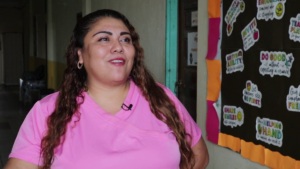
Azalia Magana
Azalia Magana, Mother
“These teachers are continuously getting education on how to deal with special needs kids and it gave me assurance knowing that my child won’t be the first child that comes with a disability. He won’t be the first child that has autism. The teachers would have had previous experience and we learn from it. Even though maybe they don’t have a master’s degree in special ed, they have that experience and they have people that do have that education background that will pass on that knowledge to them. So that was one of the reasons why I chose Horizon.”
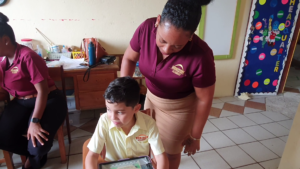 Ensuring that everyone can learn, regardless of their ability or disability, is essential for fostering an inclusive society. In Belize, the Ministry of Education is actively working towards this goal. Leading the way in this effort is Horizon Academy, arguably the only school that has independently championed this inclusive approach. Elvia Avilez is the school’s principal.
Ensuring that everyone can learn, regardless of their ability or disability, is essential for fostering an inclusive society. In Belize, the Ministry of Education is actively working towards this goal. Leading the way in this effort is Horizon Academy, arguably the only school that has independently championed this inclusive approach. Elvia Avilez is the school’s principal.
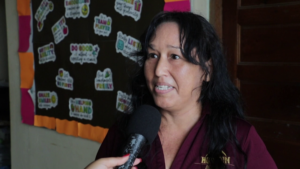
Elia Avilez
Elia Avilez, Principal, Horizon Academy
“Since Horizon Academy’s inception in 2009, inclusion was at the heart of its beginning and it just lends itself to the guiding principles that we refer to as CHIP, which is Child centered, Holistic, Inclusive, and Progressive. And so all of these principles link together in making Horizon Academy one of the very few schools in the nation who has embraced inclusion fully. This is intentional and it again it it’s just because we fully embrace the philosophy of inclusion and a part of that philosophy is indeed for all of our children to be in the classroom and we have created a special education division that intentionally has a plan in ensuring that all our students’ learning needs are met and they are included in the regular classroom where we have our children who are neurotypical and our children who are neurodiverse as well.”
Horizon Academy’s growing student population includes twenty-five students with special needs. To support these students, the Special Education Department employs dedicated individuals who provide essential assistance and guidance, also known as paraprofessionals.
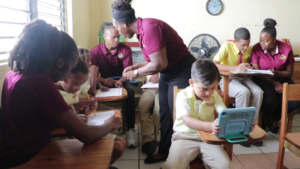 Elia Avilez
Elia Avilez
“These services are provided in collaboration with the teacher, the parent, and our support teachers, and that term is now being recognized as the paraprofessionals. Where we only had one, and then two, over the years that number has increased. This year we have eight paraprofessionals with our special education coordinator who also acts as a paraprofessional, making it nine persons who are a part of the special ed division.”
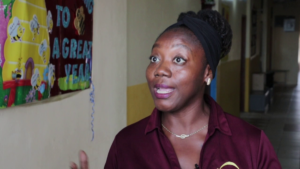
Inga Sandoval
Inga Sandoval, Special Education Coordinator, Horizon Academy
“Firstly, we provide support in the classroom with the paraprofessionals. The paraprofessionals serve as a bridge between the special ed department and the classroom. So they work with the students inside the classroom and they work with them based on the curriculum that is being given. We work with them on a slower pace you’d say or we do adoption and we also do modification on the work so that these kids can learn and understand and get the work done.”
Paraprofessionals have been formally integrated into Horizon Academy’s staff since its inception. In contrast, many other schools require parents to independently provide a paraprofessional. Pedro met his paraprofessional, Gilda Broaster, three years ago. Now supporting him in Infant 2, Broaster has become an integral part of his academic journey at Horizon. She shares with us what their interaction has been like.
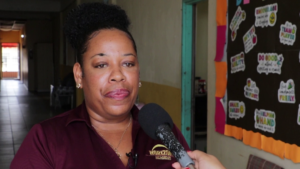
Gilda Broaster
Gilda Broaster, Paraprofessional, Horizon Academy
“When I met him it took a lot of structuring, social learning and even the relationship that I have with his mom, keeping communication on what we’re working on, what works, what doesn’t work, as well as tips from them on what works at home. Also he’s very smart and a good listener. His level of learning is, to me, very high. So, it’s just figuring out what works for him and trying to stick to that.”
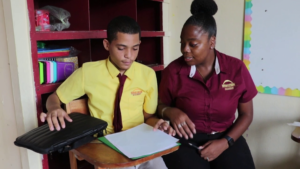 Azalia Magana
Azalia Magana
“When we came he did preschool, infant one and now infant two and I was blessed enough to have Ms. Gilda Broaster. She’s the paraprofessional that’s with him. Pedrito immediately fell in love with her. She is a teacher, she’s a mother, she’s a friend all in one.”
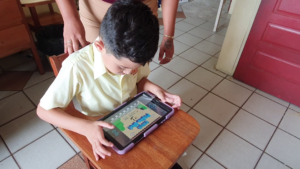 At Horizon Academy, the level of aid provided to students with special needs, like Pedro, is tailored to their individual requirements. The Special Education Coordinator says that they support a wide range of special needs, from physical disabilities to severe learning challenges, while emphasizing the importance of classroom inclusion.
At Horizon Academy, the level of aid provided to students with special needs, like Pedro, is tailored to their individual requirements. The Special Education Coordinator says that they support a wide range of special needs, from physical disabilities to severe learning challenges, while emphasizing the importance of classroom inclusion.
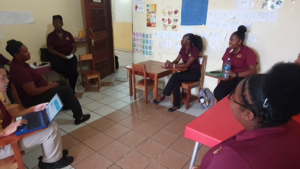 Inga Sandoval
Inga Sandoval
“This is beneficial, you see, for both the child who is a special learner and also the normal students because it’s kind of like a sensitization then where they learn and understand that, hey, there’s other children who learn differently, you know. So when they do leave Horizon and they’re out there in society, they already know, okay, there’s other kinds of disabilities, not just normal, you see, normal people within the community.”
Gilda Broaster, Paraprofessional, Horizon Academy
“What we do is we observe their behavior. We observe how they interact, the academic level that they’re at. We do something called benchmark where we test to see where they’re at academically. And then we go from there based on the child, the things that they like, the things that they gravitate to, when it comes to learning, because we try to incorporate everything into learning.”
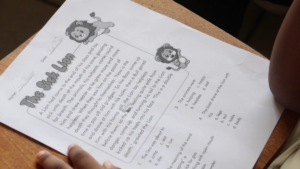 The goal is to provide the necessary support to these students until they no longer need it. Azalia Magana says it’s a reality she did not think would come this soon. Pedro has not only advanced in his level of learning, but shows promise of parting ways with his parapro, Miss Broaster.
The goal is to provide the necessary support to these students until they no longer need it. Azalia Magana says it’s a reality she did not think would come this soon. Pedro has not only advanced in his level of learning, but shows promise of parting ways with his parapro, Miss Broaster.
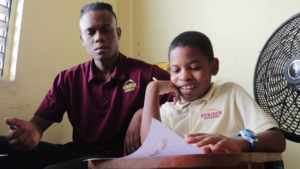 Azalia Magana
Azalia Magana
“The principal, Ms. Elia, told me our goal is to help him until he doesn’t need us anymore. And I thought, no, he’s going to need a paraprofessional throughout the years. I thought that he would always need it. But the support was greater when he was in preschool and infant one, but he’s gotten more independent. And so this year in infant two, we got to the point that Miss Gilda would tell me, Pedro doesn’t need me that much. It’s such a blessing that we’re living here in Belize City and we had the opportunity to have him in a school like this. My heart goes out to all those parents that don’t have the opportunity to have their kids with a paraprofessional in the class when they need it because, I don’t know, had this not been possible, I don’t know if I would have moved to a different country, or quit working to be able to be that paraprofessional. I know that he needed it, and I think it’s essential.”
Looking on the Bright Side, I’m Sabreena Daly.






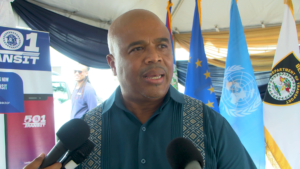
Facebook Comments